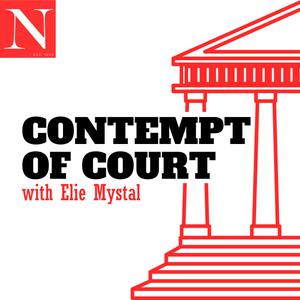
Contempt of Court with Elie Mystal
The Nation Magazine
- 46 minutes 10 seconds'Women Don't Get AIDS, They Just Die From It' | Blindspot
Listen to an excerpt of the new podcast series Blindspot: The Plague in the Shadows, which revisits the early years of the HIV epidemic in New York City and how the virus tore through some of our most vulnerable communities while the wider world looked away. A co-production of The HISTORY® Channel and WNYC Studios.
You can listen to more of Blindspot: The Plague in the Shadows here.
Advertising Inquiries: https://redcircle.com/brands
Privacy & Opt-Out: https://redcircle.com/privacy28 February 2024, 10:00 am - 1 hour 4 minutesDelegitimize The Court
This is the eighth and final episode of Contempt of Court, our podcast series about reforming the Supreme Court. On this episode, we’re going to talk about the court’s only true form of power: legitimacy.
To discuss potential paths toward delegitimizing the Court, my first guest on this episode is Harvard Law School professor, Nikolas Bowie. He makes a compelling case that the people, through their representatives, should be the ones in charge, not the Supreme Court.
Afterward, Rhiannon Hamam, host of the fantastic Supreme Court podcast 5-4, has some thoughts on what’s happening on the ground, as people try to take back power from the Court through direct action.
Advertising Inquiries: https://redcircle.com/brands
Privacy & Opt-Out: https://redcircle.com/privacy22 August 2023, 6:00 am - 52 minutes 34 secondsStripping The Court of Its Power
Instead of reforming how the Supreme Court uses its power, what if we took its power away?
Harvard Law School professor, Ryan Doerfler, and Michigan Law School Professor Leah Litman join the podcast to discuss their perspectives on jurisdiction stripping.
Advertising Inquiries: https://redcircle.com/brands
Privacy & Opt-Out: https://redcircle.com/privacy15 August 2023, 6:00 am - 49 minutes 19 secondsHow to Fix The Supreme Court’s Ethics Problem
The Supreme Court has a serious ethics problem—actually, ethics problems. The justices have been dogged by allegations of corruption. They’ve been peppered with questions about how they make money. And then, of course, there’s the long career of Clarence Thomas, who, along with his wife Ginni Thomas, appears so brazenly corrupt that his scandalous behavior has made the very idea of Supreme Court ethics seen like a complete joke.
I have long argued that Supreme Court ethics reform is as critical to fixing the Supreme Court as any of the more structural changes that reformers want to make—like increasing the number of justices or decreasing the length of time those justices serve.
On this episode of Contempt of Court, we’re going to talk about what can be done to stop these people from wallowing in the slop of their own graft. First up, we talk to New York Times Magazine writer and Yale Law professor, Emily Bazelon about what corruption looks like when it comes in the form of a Supreme Court justice. Then, we talk to Georgia Congressman Hank Johnson, who is one of the few lawmakers who is doing something about it.
Advertising Inquiries: https://redcircle.com/brands
Privacy & Opt-Out: https://redcircle.com/privacy8 August 2023, 9:00 am - 30 minutes 33 secondsFinding the Balance
Beyond raw court expansion, or the (probably unconstitutional) big stick of forced term-limits, there are a number of other ways one might go about balancing the Supreme Court.
On this episode of Contempt of Court, Elie Mystal speaks with legal experts Dan Epps and Steve Vladeck about potential ways we might find that balance.
Advertising Inquiries: https://redcircle.com/brands
Privacy & Opt-Out: https://redcircle.com/privacy1 August 2023, 6:00 am - 26 minutes 55 secondsReform the Media
The court ended its most recent term completely off the chain. Having already killed reproductive rights, it accomplished another longstanding conservative goal: banning affirmative action in college admissions. That's not even the half of it.
And yet, a lot of the mainstream media coverage suggested that the Court turned *moderate* and worked hard to achieve a mainstream consensus.
Why does the media keep feeding us this bullshit? Let’s talk about it.
Advertising Inquiries: https://redcircle.com/brands
Privacy & Opt-Out: https://redcircle.com/privacy25 July 2023, 4:00 am - 26 minutes 26 secondsYou're Wrong About Term Limits
Term limits are by far the most popular form of Supreme Court reform. According to a recent poll from the Associated Press, two-thirds of Americans favor term limits for Supreme Court justices.
On this episode of Contempt of Court, Elie Mystal is joined by Leah Litman and Aaron Belkin, to discuss what's wrong with everybody's favorite reform option.
Advertising Inquiries: https://redcircle.com/brands
Privacy & Opt-Out: https://redcircle.com/privacy17 July 2023, 10:05 pm - 15 minutes 17 secondsElie's Court Packing Plan
When most people talk about expanding the Supreme Court, they're talking about adding a few justices. Two or four to the bench. But I am not most people. I do not think we should add a few justices to get into an endless tit for tat. With Mitch McConnell and his federal Society forces, I think we should blow the lid, clear off this incremental, institutionalized motherfucker, and add 20 justices. Here's why.
Advertising Inquiries: https://redcircle.com/brands
Privacy & Opt-Out: https://redcircle.com/privacy10 July 2023, 9:50 pm - 27 minutes 9 secondsPacking The Court!
On this episode, we start with the most powerful reform available: court expansion.
As a matter of Constitutional structure, Court expansion has always been the constitutionally preferred way of handling a court that has overstepped its bounds. But as a political matter: court expansion has been treated like it is a radical solution. But It’s not. It is the way a President and Congress can check the Supreme Court, and it’s the easiest and most simple method of court reform.
Chris Kang and Congressman Jamaal Bowman join Contempt of Court to explore what court expansion actually is, and how attitudes around it are finally changing.
CREDITS:
Host: Elie Mystal
Producer: Babette Thomas
Executive Producer: Ludwig Hurtado
Advertising Inquiries: https://redcircle.com/brands
Privacy & Opt-Out: https://redcircle.com/privacy3 July 2023, 10:00 pm - 4 minutes 10 secondsWelcome to Contempt of Court!
If you have a problem with how the Supreme Court operates and how much power it is allowed to hold over the rest of us: welcome! On this show, we'll look at ways to make the Supreme Court stop hurting us. In each episode, The Nation's Justice Correspondent Elie Mystal will talk to experts and advocates who are doing the work to reform the Supreme Court and salvage American democracy from the court’s greedy jaws.
Subscribe for new episodes each Tuesday!
Advertising Inquiries: https://redcircle.com/brands
Privacy & Opt-Out: https://redcircle.com/privacy26 June 2023, 8:00 pm - More Episodes? Get the App
Your feedback is valuable to us. Should you encounter any bugs, glitches, lack of functionality or other problems, please email us on [email protected] or join Moon.FM Telegram Group where you can talk directly to the dev team who are happy to answer any queries.
 Why Is This Happening? The Chris Hayes Podcast
Why Is This Happening? The Chris Hayes Podcast
 Talking Feds
Talking Feds
 #SistersInLaw
#SistersInLaw
 Jen Rubin's Green Room
Jen Rubin's Green Room
 Making the Case
Making the Case
 Amicus With Dahlia Lithwick | Law, justice, and the courts
Amicus With Dahlia Lithwick | Law, justice, and the courts